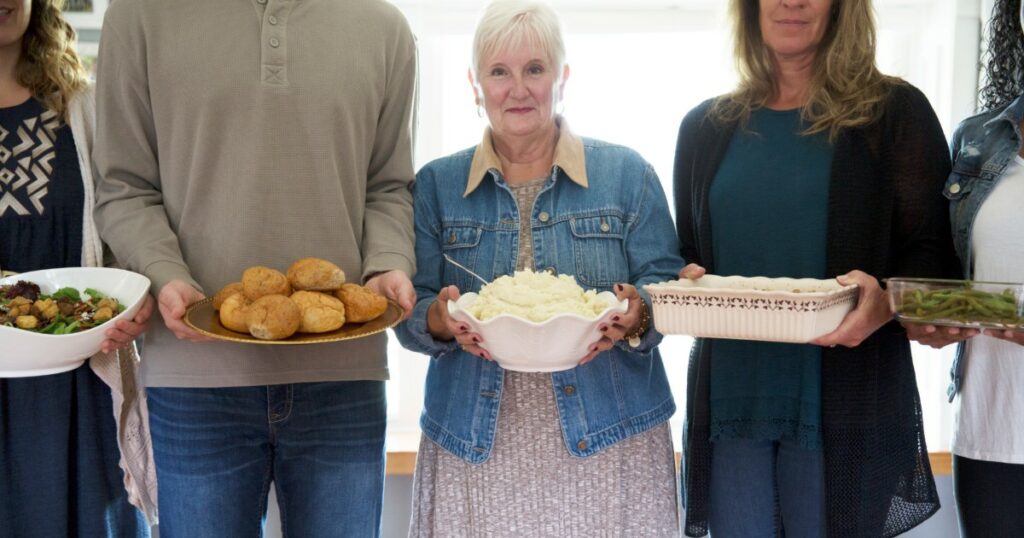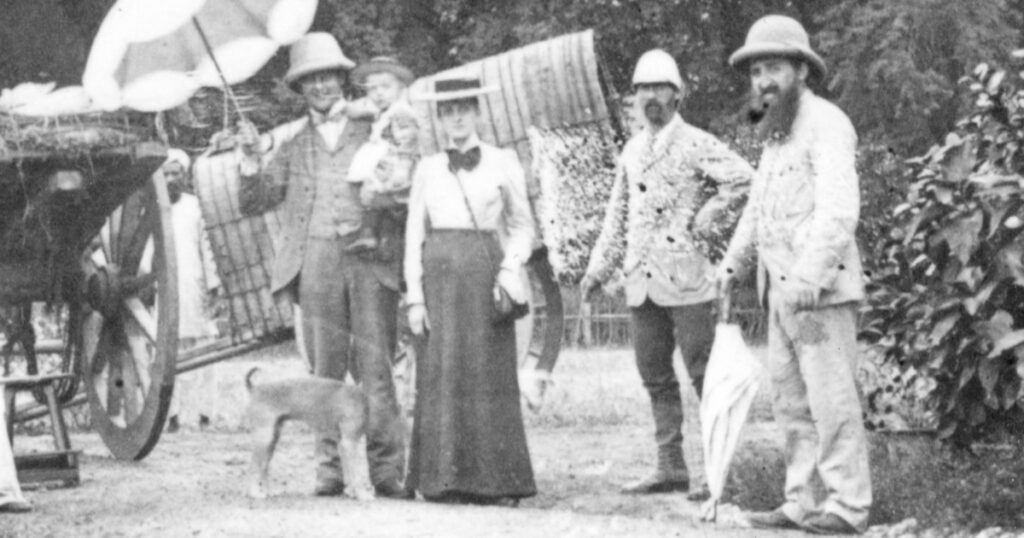by Rachel Bomberger
Lasagna and honey ham and baked spaghetti and fried chicken; green bean casserole and au gratin potatoes; hamburger hot dish covered rim to rim in Tater Tots; broccoli and rice smothered in a blanket of cheese.
The savory, commingled aromas hit your nostrils before you even enter the fellowship hall. Inside, the plugs of slow cookers (ancient and modern) — full of saucy meatballs and cocktail sausages, kielbasa and sauerkraut — stuff every available electrical outlet. All along the table, lids are being loosened on the salads — if “salad” is even the right word to describe these colorful concoctions of mayonnaise and green peas, shredded coconut, whipped cream and Jell-O.
Old folks chat, sipping weak coffee. Kids slyly scope out the dessert table, drawn like magnets to the lemon bars and snickerdoodles, brownies and peach pie.
Last to the party is always the pastor, whose presence is as ubiquitous as the coffee. Yet even he finds himself at the mercy of the brigade of busy kitchen helpers. Nobody eats until they say so.
And they don’t say so — ever — until the last dish has emerged from the oven and been set, steaming, on the table.
Finally, someone in an over-sized apron sighs, “I guess that’s everything,” and the rumor spreads like hungry wildfire through the hall: “Is it time? I think it might be time. Where’s Pastor? Let’s pray!”
Welcome to heaven on earth: the Lutheran potluck.
Luck of the pot?
Though Christian fellowship meals are at least as old as Abraham, it’s a little tricky to piece together a comprehensive history of the practice. Potluck suppers have never been the theaters in which theologians have argued and settled the Church’s great controversies. They’re the domain of ordinary, everyday, nondescript Christians, many of them poor and obscure, most of them women — not the sort of people who generally make the history books.
Scholars aren’t even completely positive about where the name “potluck” comes from. One good guess (thought it’s only a guess) traces the term’s roots back to 17th-century England, where drop-in guests were offered “the luck of the pot” — which might roughly translate to “all you can eat of whatever we’re having.”
The social history of the potluck is almost as vague as the etymology of the word itself. Garrison Keillor, throughout his decades of storytelling on the radio show “A Prairie Home Companion,” has been one of the best — if not, perhaps, the most historically reliable — chroniclers of this idiomatic fixture of Lutheran life.
In Keillor’s homespun stories, the ladies of Lake Wobegon Lutheran Church seemed always on the cusp of holding their next potluck supper, where Tater Tot hot dishes and “glutinous casseroles” reigned supreme. Keillor even went so far in his admiration as to pen a musical ode to one potluck staple — the tuna noodle casserole — which he performed live with Jean Redpath in 1986. The last verse of this satirical ballad (sung to the tune of “Whispering Hope”) ends thusly:
When my earthly journey is over,
gladly I’ll take to the air.
Afterwards in the church basement,
they’ll serve tuna casserole there
(Lord willing).1
‘With glad and generous hearts’
Despite its historical obscurity, it’s plain that the potluck, or something like it, has been part of the Christian church from the beginning. Consider this familiar passage from the book of Acts:
And they devoted themselves to the apostles’ teaching and the fellowship, to the breaking of bread and the prayers. And awe came upon every soul, and many wonders and signs were being done through the apostles. And all who believed were together and had all things in common. And they were selling their possessions and belongings and distributing the proceeds to all, as any had need. And day by day, attending the temple together and breaking bread in their homes, they received their food with glad and generous hearts, praising God and having favor with all the people. And the Lord added to their number day by day those who were being saved. (Acts 2:42–47)
Having all things in common? Distributing to all as any had need? Receiving their food with glad and generous hearts? It all sounds a lot like the stuff of potlucks to me.
Given this and other evidence, it’s not hard to imagine that when our earliest Christian forebears came together, they brought a dish to pass.
Welcome guests, welcome hosts
Everyone is equal at the potluck; everyone is included. The first-time visitors who arrive unprepared and empty-handed are welcomed with open arms. The widower whose only offering is a bag of chips or a pint of store-bought potato salad is sent back to the table for seconds. The boisterous family that shows up with four children and one veggie tray goes home with half a dozen full bellies (and half a sheet cake, besides).
Everyone is welcome at the potluck — not only as a guest, but also as a host.
In this way, the potluck is like a great melting pot of the Church. Each person’s culinary offering mingles side-by-side with every other person’s — easily, amiably, as if they were dearest friends or nearest neighbors. Even as we chuckle together at Lake Wobegon’s Jell-O salads and tuna noodle casseroles, we know, too, that the story of the Lutheran potluck is more complicated, more beautiful and much less monochromatic than that. Tamales are welcome at the potluck. So are collard greens. And pot stickers. Oxtail stew. Fried plantains.
Whatever it is that you like best to eat and cook, the potluck tells us; whatever food best expresses your family’s taste, personality, culture and heritage — bring that. Share that.
My own go-to potluck offering recently has been a green salad made of home-grown kale, dried cranberries, toasted almonds and crumbled feta cheese, tossed together with olive oil, balsamic vinegar and stone-ground mustard. The ladies in the kitchen may raise an eyebrow when they peel back the lid on this bowlful of hipster foodie eccentricity, but they’ll find a spot on the table for it all the same — right in between the seven-layer salad and the pineapple pink fluff.
Tasting heaven on earth
We often refer to the Lord’s Supper as a “foretaste of the feast to come” — and it surely is. In this meal, heaven touches earth, as Christ feeds His people, drawn from “every nation, from all tribes and peoples and languages” (Rev. 7:9), with His own body and blood.
Yet for me, there’s also something heavenly about a potluck.
Gathered together around the table in the name of Christ, strangers become friends and friends become sisters and brothers. The hungry are fed with “rich food full of marrow” (Is. 25:6), in savory abundance. The “poor and crippled and blind and lame” (Luke 13:21) — and those pushing walkers or toting small children — are first in line, and “the greatest among you” (Matt. 23:11) can be found in the kitchen afterward, washing up. Even those who arrive empty-handed are not turned away, and no one (not even a kale eater like me) has to worry about whether there will be room for their dish on the table.
Surely the kingdom of heaven is like this.
All a dream?
My editor (and yes, even editors have editors) cautions me at this point not too stray too far into the realm of fantasy. The Church is made up of sinners, after all, and no potluck supper can possibly be as wonderful as all this. Wherever human beings gather together, personalities inevitably conflict, and self-service is always on display.
Perhaps he’s right. Perhaps what I’ve described above — the excitement, the laughter, the fellowship, the pineapple pink fluff — was all only ever a dream.
Yet even so, I tell you the truth: I have seen it. Never all at once, perhaps, or at the same time, or in the same place, but everything I’ve written about here is real, right down to the oxtail stew. I have witnessed firsthand the power of the potluck to bring Christians together, and I love it. If you have ever, even for a moment, caught a glimpse, you don’t need me to tell you how good it is. If you haven’t yet seen it for yourself, I challenge you: Ask your pastor or social ministries committee to add the word “potluck” to the church calendar sometime. Ask — and watch what happens next.
This article originally appeared in print in the March 2019 issue of The Lutheran Witness.
1Garrison Keillor, “Tuna the Food of My Soul,” from “A Prairie Home Companion,” 1986, https://youtu.be/LzyI_Hh8ufI. Used with permission.







We a had a discussion about this very thing last night with some good Lutheran friends. Our church seems to have forgotten about potlucks and instead has been providing dinner, this is getting expensive and takes away the whole experience of trying new,and different foods and learning more about our members from their choice of shared dishes.
Love the article.